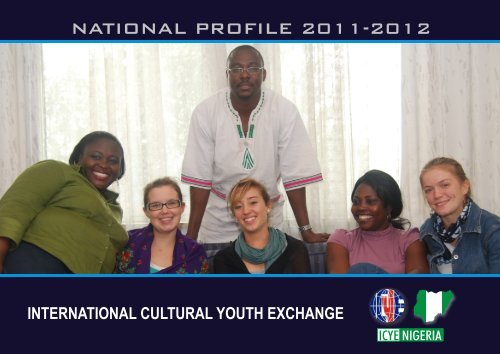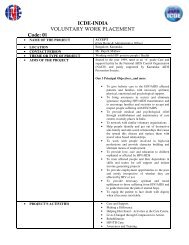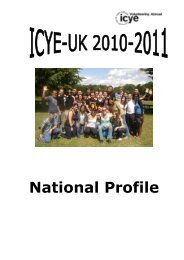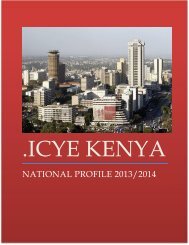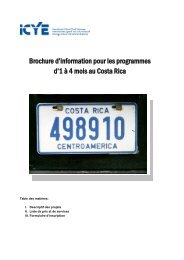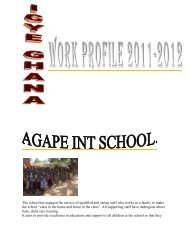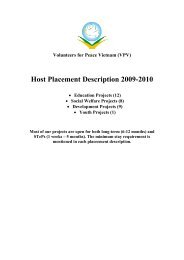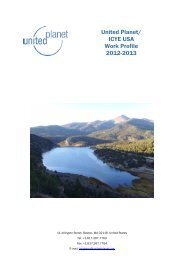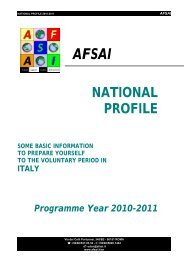NATIONAL PROFILE 2011-2012 - ICYE
NATIONAL PROFILE 2011-2012 - ICYE
NATIONAL PROFILE 2011-2012 - ICYE
- No tags were found...
You also want an ePaper? Increase the reach of your titles
YUMPU automatically turns print PDFs into web optimized ePapers that Google loves.
ForwardIt gladdens our heart to know that you are coming to spend your exchange year in Nigeria. <strong>ICYE</strong> offers you aunique opportunity to challenge and experience cultural differences, and provides a framework for a fun andenriching experience.Coming to Nigeria with an "OPEN MIND" is necessary for you to enjoy your stay. Living with and understandingpeople who have a perspective different from yours will challenge you. This National profile is expected to giveyou a brief knowledge of what you should be expecting in Nigeria. It will not give you the whole, idea aboutNigeria but if read carefully, you will be on the right track.Living in another culture might not be easy but with a deep commitment and the effort of the <strong>ICYE</strong> Nigeria staffand Co-workers who are eager to help you, you will surely have a rewarding experience.We are looking forward to meeting you and hearing from you.YOU’RE WELCOME ( E Kaa bo)<strong>ICYE</strong> NIGERIA
NigeriaLocation:West Africa, bordering the Gulf of Guinea, between Benin and CameroonGeographic Co-ordinates:4 and 14 degrees latitude north and 2.30 and 14.30 degrees longitude east.Area:Total: 923,770 sq kmLand: 91 0,770 sq kmWater: 13,000 sq km
…NigeriaLand boundaries:Total: 4,047 kmBorder Countries:Benin 773 kmCameroun 1,690 km, Chad 87 km,Niger 7,497 kmCoastline: 853KmLand in abundance in Nigeria for agricultural, industrial and commercial activitiesMaritime Claims:Continental Shelf: 200m depth or to the depth of exploitation. Exclusive Economic Zone: 200nm with maximumwater depth varying from 2600m to 3000 m.Territorial Waters: 30 nm (recently reduced to 12 nm)
…NigeriaClimate:Equatorial in the Niger Delta and costal areas, tropical up to the middle section and arid in the extreme north.Temperatures average from 23-31 degree C in the South with relatively high humidity and 18-35 degrees C inthe North. The Jos plateau and the eastern highlands moderate the temperatures, with maximum no morethan 28 degrees C and minimum sometimes as low as 14 degrees C in the period of November to February.Two main seasons-rainy and dry with length of the rainy season decreasing progressively from 9-12 months inthe south to under 5 months in the extreme north. The dry season commences from harmattan, a dry chillyspell that lasts till February or more recently early March and is associated with lower temperatures, a dustyand hazy atmosphere brought about by the North-Easterly winds blowing from across the Sahara. The hottestmonths are from February to March/early April. Annual rainfall ranges from 3,800 mm in the Niger Delta to 650mm at the north east of the country. There is usually a slight break in the rains of 2-3 weeks in late July andearly August in some parts of the south. Relief also affects the rainfall distribution.
…NigeriaMain Features:The following landscapes are prevalent: the costal areas, consisting of large low lands (less than 300m), theNiger Delta with numerous tidal creeks and rivers. Along the coast are many big lagoons, which receive watersfrom some inland rivers flowing southwards. The natural vegetation consists of mangrove swamps along thecoast and in the Delta and tropical evergreen rain forest in the inland areas. Further north the flat extends intothe Niger and Benue river valleys. The highlands (300 to 5OOm) in the southeast and south west (westernUplands, Udi plateau, Dban Hills) are densely populated and were originally covered by tropical rain forest.Going north, the rainforest is gradually replaced by savannahs. The Jos plateau (300-1200m) located close tothe centre of the country rises to 1,780m at Shere hills, its highest point. The plateau is a watershed, fromwhich streams flow to lake Chad and to the rivers Niger and Benue. The line declines steadily northwards fromthe plateau into the large sandy high plains of Hausaland scattered with rocky dome outcrops. The main riverof Nigeria is the Niger, the third longest in Africa. It originates from Fouta Djallon Mountains of Sierra Leoneand enters Nigeria for the last one-third of its 4,200km course. Its main tributary is river Benue, which rises inthe Cameroun and merges with the Niger at Lokoja before emptying their waters into the sea in afanlike systemof numerous tidal creeks and rivers that form the Niger.
…NigeriaElevation Extremes:Lowest point: Atlantic Ocean OmHighest point: Chappal Waddi 2,419m (Highest point on Jos Plateau is 1,780m)Mineral Resources:Petroleum, natural gas, tar sands, tin, columbite, iron ore, coal, limestone, lead, zinc, gold etcLand Use:Arable land: 33% PermanentCrops: 3%Permanent Pastures: 44%Forest and Woodland: 12%Others: 8%Irrigated land: 9,570 sq kmNatural Hazards: periodic droughts, erosion.
…NigeriaPopulation:140,003,542 (December 2006 census); Nigeria is famous for being the largest back nation in Africa. Thispopulation is made up of about 374 pure ethnic stocks.Age Structure:Males: 71,709,859Female: 68,293,08Population growth rate:3.05% (1997 est.)Main Religions:Christianity, Islam, Traditional.
…NigeriaMain Ethnic Groups:Nigeria has more than 250 ethnic groups with varying languages and customs creating a country of rich ethnicdiversity. The largest ethnic groups are Fulani/Hausa, Yoruba, Ibo accounting for 68% of the population, whilethe Edo, Ijaw, kanuri, Ibibio, Ebira, Nupe and Tiv comprise 27%. Other minorities make up the remaining 7%.The middle belt of Nigeria is known for its diversity of ethnic groups, including the Pyem, Goemia and KofyarMain Languages:Hausa, Igbo, Yoruba and over 500 spoken languages including English (Official)Main Commercial/lndustrial Cities:Lagos, Onistha, Kano, Port Harcourt, Aba, Ibadan, Maiduguri, Jos, Kaduna, Warri, Benin and Asaba.
…NigeriaLiteracy:Definition: age 15 and over can read and write.Total population: 57.1 %Male: 67.3%Female: 47.3% (1995 est.)Nigeria is a magnificent land and within it lies a diversity of life, culture and people. Apart from the naturalresources under the earth's surface, a bountiful harvest of fruits and vegetables is also reaped from fertilefarming districts across the Country. The cultural diversity coupled with the natural beauty in real Africansetting that attracts people all over the world makes Nigeria a curious and one of the most interesting places inthe World.
Bio-Diversity in NigeriaNigeria is important for Bio-Diversity. Nigeria possesses a wide range of ecosystem. These range from tropicalrain forest on the central, eastern and Northeastern highlands and wetlands in the coastal and inland regionsto the sub-Saharan in the North. Nigeria supports a wide species of animal and birds, which cannot be found inany part of the world. It is widely believed that the areas surrounding Calabar, Cross Rivers State contain theworld’s largest diversity of butterflies. This led to the establishment of sanctuaries and parks in areascharacterised by high level of biological diversity, such endangered species are the forest elephant, low landgorilla manatee, drill chimpanzee and the red-headed white fowl can be located in these areas.
…Bio-Diversity in NigeriaAreas of interest include:1. Conservation Lekki Nature in Lagos: This centre is notable for its 100 already identified different species ofbirds in their natural habitat. Other animals include Mona monkey, Cane rat, Giant forest squirrel, and Giantrat, Monitor Lizard. Also Crocodile, Pangolin, Bushbuck and Quicker.2. Okomu Wildlife Sanctuary in Edo State: This is a home to the threatened white-throated monkey endemiconly to this part of the World. Others include: The forest Elephants, Chimpanzees, Leopards and red-cappedMangabey.3. Cross River National Park: This area is densely covered with primary rain forest with annual rainfall of over3,500mm. This rainforest is believed to be the most biologically diversed in the world as well as being thehabitat of some of the richest variety of flora in the world. The area also contains a large variety of mammals;the most famous of which are the lowland Gorillas. Others are the Chimpanzees and the endangered DrillMonkeys, leopards, Buffalos, Duicker Elephants, Red River Hogs and Red headed white fowls.
People and ways of lifeThe Hausa/Fulani people of Northern Nigeria are linked together by one language, which is the HausaLanguage. They have the Arabian way of dressing like the one found in the Middle East, which is very commonamongst them. The people are mostly cattle rearers and also engage in irrigation farming. Because of thereligion, they practice the Sharia Law The religious and the traditional authority are wielded around the Sultanof Sokoto who is helped to rule by the Emirs that he delegates authority to.The Yorubas of the Western part of Nigeria lay claim to Ile-lfe as the spiritual home where all of them comefrom and indeed every race in the world, and to a common descent, which is Oduduwa. The people are mainlyinto Agriculture and Fishing and they cultivate such crops as Cocoa, Yam, Maize, Cassava, etc. The traditionaldresses are Aso-Oke, Adire etc. Before the arrival of Christianity, the people were involved in the worship ofvarious traditional gods such as Sango, Obatala, Ogun etc, each of which have particular periods of the yearwhen they celebrate their festivals.
…People and ways of lifeThe Igbo speaking people, who inhabit the Eastern part of the Country, are well known for their -trading andfarming, they are regarded as one of the most enterprising people on the Coast of West Africa and sometimesreferred to as the "Jews of Africa". The important towns in Igbo land are Asaba, Onitsha and Owerri. Thecommon foods here are Akpu, Rice and Garri.We have other people like the Nupes and the Tivs in the middle belt of the Country and the ijaws, the Ogonis,Calabars etc. in the South-Eastern part of the Country.However, most Nigerians now live in Cities and wear Western style clothings. English is the official languageand is widely spoken in the Urban Cities. There is also the "Pidgin English" which is the most widely understoodlanguage both of educated and uneducated people who benefit more when communicating in "Pidgin" (BrokenEnglish).
GovernmentCountry Name: NigeriaConventional Long Form: Federal Republic of NigeriaData Code: N1Government type:Parliamentary democracy of the Presidential SystemThree tier structureA Federal government36 State governments and the Federal Capital Territory 774 Local government administrations.Federal Capital: AbujaThe capital was official moved from Lagos to Abuja on 12 December 1991.
…GovernmentAdministrative Divisions:36 states and one Capital Territory (Abuja): Abia, Adamawa, Akwa Ibom, Anambra, Bauchi, Bayelsa, Benue,Borno, Cross River, Delta, Ebonyin, Edo, Ekiti, Enugu, Gombe, Imo, Jigawa., Kaduna, Kano, Katsina, Kebbi, Kogi,Kwara, Lagos, Nassarawa, Niger, Ogun, Ondo, Osun, Oyo, Plateau, Rivers, Sokoto, Taraba, Yobe and Zamfarastates. Each of these states is further split up into smaller administrative units called Local Government Areas(LGAs) There are 774 LGAs in the country.Independence:1st of October, (1960)Constitution:1999 constitution is in force and is currently under review.
…GovernmentLegal System:Based on English Common Law, Islamic Law and customary Law.Executive Branch:The democratically elected government of Umar Musa Ya'radua was sworn in on May 29th, 2007. Thecomposition of the Federal Executive Council followed soon after with the appointment of Ministers, SpecialAdvisers and Assistants that cut across all political party lines to make for integration, cooperation andharmony within the Nigerian polity.Legislature Branch:There are two main houses that form the National Assembly viz: The Senate made up of 109 membersrepresenting their various senatorial districts. They are led by a Senate President. The lower house ofRepresentatives is made up of 360 members representing their various constituencies. They are led by aSpeaker of the House. The National Assembly carries out its tasks through relevant committees.
…GovernmentJudiciary:The Judiciary is independent of the Executive and legislature and has a Chief Justice as head of the SupremeCourt of NigeriaPolitics:There at the moment, thirty self-funding political parties registered by the electoral committee INEC. They allvied for executive and Legislative, positions at the Local government, States and National Levels during themilitary-to-civilian transition programme.Diplomatic Representation:Nigeria has Missions or Representatives in 92 countries world-wide. Flag description: three equal vertical bandsof green (hoist side) white, and green.
<strong>ICYE</strong> Nigeria<strong>ICYE</strong> Nigeria started operations in 1982 as an independent establishment within a Christian Organisation. <strong>ICYE</strong>Nigeria consists of National Committee office, Staff and Co-workers (Co-workers are made up of returneesthosewho have once gone on the programme) and other volunteers who have assisted in the work of <strong>ICYE</strong> inthe National Office and in the development of the programme on Zonal levels.The Staff are permanent employees who work full-time for the organisation in its National Office. They carryout the administrative and programme responsibilities of the organisation. The General Assembly is the highestdecision making body of the committee and is headed by the Chairperson.<strong>ICYE</strong> Nigeria aspires towards the development of the leadership of young people through living and workingabroad for one year. The exposure and experience will be of great benefit to the Exchangee(s). He/She willmake new friends abroad, learn new language and widen his/her horizon and thus make the work a muchbetter place.
Our ExpectationWe expect that all Nigerian-bound Exchangees would have been well prepared and that their main motivationof participating in the programme is social justice and world peace. Furthermore, we expect all Exchangees to:a. Be able to communicate in English.b. Be matured enough to stand some difficult situations of a developing Country - possibly between the ages23 and 27.c. Co-operate with <strong>ICYE</strong> Nigeria, both paid workers in the office as well as the Co-workers. Interact freely and beable to discuss peacefully and with some maturity.
…Our Expectationd. Discuss any major hosting problem with <strong>ICYE</strong> Officials first and should always remember that their behaviour(if unruly) will reflect on them during the duration of the programme.e. Develop the habit of discussing his/her problems. No matter how small it is.f. Actively participate in programmes, events and take initiatives.g. Bring forward suggestions and grievances or appeal peaceably Not to interfere with the organisationalstructure of the Board, but to show ways of improving positively. Everybody has his/her own responsibilities;the workers are accountable to the president.h. Do not expect all host families to be alike.i. Be interested in the local languages and learn to communicate with them
…Our Expectationk. Be aware that hosting situations are not easy to get. Exchangees coming to Nigeria should be ready to acceptand not reject any work placement.i. Be responsible and mature.This may seem a lot to expect but we hope Exchangees will seriously consider whether <strong>ICYE</strong> Programme isreally what they want to participate in or not. Mention must also be made of parents who are anxious anddisturbed about what is happening to their children while abroad. It must be emphasised that <strong>ICYE</strong> Nigeria isbeing coordinated by matured and capable hands and should at all times be rest assured that their children arebeing taken very good care of.j. Contribute positively to the work placement, bearing in mind that pocket money comes from workplacements.
Visa InformationOur visa procedure is still the same. We always want our Exchangees to accept only visas that have STR. It isimportant that your visa has STR. Only volunteers coming for short term (3months) programme can apply fortourist visaThere are two ways to enter Nigeria as an Exchangee:1) National Committee sending exchangees to Nigeria must do the selection as early as possible and byFebruary latest, should send the full name, age, educational qualifications of the Exchangee including passportnumber to us in Nigeria. We shall then inform the exchangee when to report at the Nigerian embassy of his/hercountry to collect his/her visa with STR.Anything short of this will create problems. DO NOT ACCEPT TOURIST VISA!You must collect and bring three copies of the form that you filled in the Nigerian Embasssy to Nigeria. Theform is titled 'VISA ENTRY APPLICATION FORM" IMMI22. It should be stamped at the back.
…Visa Information2) On the alternative, immediately you select whoever is coming to Nigeria send us his/her full name orapplication forms. We shall then send a letter which he/she will take to the Nigeria Embassy in your country toobtain a three months visa subject to regularisation (STR) - IT MUST BE THREE MONTH VISA WITH SUBJECT TOREGULARISATIONS (STR) and NOT tourist visa.The exchangee must accept and come to Nigeria with three copies of the VISA/ENTRY PERMIT APPLICATIONFORM INM122 filled at the Nigerian Embassy and duty stamped by the embassy. IF YOU HAVE DIFFICULTIES,(WE HOPE NOT) PLEASE, GET IN TOUCH WITH <strong>ICYE</strong> NIGERIAIMMEDIATELY!. The volunteer should be inform thathe or she will pay for the regularisation of the Visa when they arrive in the country.Our Postal Address is:<strong>ICYE</strong> NIGERIA,P. O. Box 1025, Sabo – Yaba, Lagos.
…Visa InformationContact Person:Adeolu Onamade374, Borno Way, Yaba, Lagos.Tel: (234) 8023138578Fax: (1) 530579 5543 (USA)3) The exchange must exercise patience when he/she arrives the country for the extension of the residencepermit as the ministry/immigration process can sometimes be slow. This we do not have authority over,eventually the regularisation is done..
Government RegulationsThere are various laws in the country. The laws apply generally to both nationals and non-nationals as long asyou are resident in Nigeria. Contravening any of the Nigerian laws by foreigners might result in deportation.
EconomyEconomic Indicators:GDP - real growth rate: 3% (1996 est.)CDP - per capita: purchasing power parity - $1 ,380 (1996 es.)GDP - Composition by sector:Agriculture: 28% Industry: 53%Services: 19% (1995 est.)Inflation rate: 13% (199 est.) New economic policy will see this rate down to a single unitLabour force: Total: 42,844 millionBy occupation: agriculture 54%, industry, commerce, and services 19%, government 15%.
…EconomyAgriculture (Main Crops):Cash crops: Cocoa, groundnuts, rubber, oil palm, cotton.Food crops: -Maize, sorghum, millet, cassava, yam, rice, plantain, soya, tomatoes, onions.Fruits: Pineapple, oranges, grapefruits, banana, vegetables. : The rainforest produce Timber and Wood orexotic species. Animal husbandry i.e. cattle. Sheep, goat and pig rearing as well as poultry and fish farming hasdeveloped over the years.Exports:Total value: $11.6 billion (f.o.b., 1995)Commodities: petroleum and petroleum products 95%, cocoa, rubber 5%Partners: US 52%, EU 34%, others 34%
…EconomyImports:Total Value: $10 billion (c.i. f., 1995)Commodities: machinery, transportation equipment, manufactured goods, chemicals, food and animals.Partners: EU 50%, US 13%, Japan 7%, Others 30%Debt- external: $28 billion (1997 est. )Economic Aid: recipient: ODA, $NACurrency: 1 Naira (N) = 1 00 koboExchange rates: naira (N) per US$ - 150 (November 2009)Fiscal year: starts 1st January.
…EconomyInfrastructures:Highways:Total: 32,105 kmPaved: 26,005 km (including 2,044 km of expressways) Unpaved: 6,100 km (1994est.)Railways:Total: 3,557 km iNarrow Gauge: 3,505 km 1.67 - m gaugeStandard Gauge: 52 km 1,435 - gauge (1995)
…EconomyWaterways:8,575 km consisting of Niger and Benue rivers and smaller rivers and Creeks.Road Network :Over 15,000 km of intercity, all weather paved roads including dual-carriage express trunks.Communications:Telephones: 492,204 (1990 est.)G.S.M.: Over 90 million usersTelephone system: Since the GSM launch, mobile telephony has rapidly become the most popular method ofvoice communication in Nigeria. Growth has been so rapid that Nigeria has been rightly described in various fora as “one of the fastest growing GSM markets in the world”Ports/Harbours:Lagos, Port Harcourt, Calabar (EPZ), anne, Sapele, Warri
TransportationApart from airplanes, which have scheduled flights within and outside the countries, there is no specific timethat one could catch a bus. Charges by bus are usually cheaper, Taxis charge a minimum of N300.00 (Threehundred naira) per drop, extra charges are negotiable. Although there are so many vehicles, it looks a bitinadequate especially in Lagos because of its high density of population. Flights are better and safer to traveloutside the country or for a long distance within the country, Nigerian roads are not very safe.
On arrival at the airportYour Airport of Arrival is the Murtala Mohammed (MM) International Airport, Lagos. You have no problem onarrival; if we have details of your flight we shall be there to meet you. In case you cannot locate us at theairport, please look for a telephone around and tell whoever picks the phone that you are a new Exchangee, (ifyou want to do this let it be during week between 8 a.m. to 5 p.m. Nigerian time (we don't work on weekends)and you will be informed on what to do. On the other hand, look for a taxi and tell the driver to take you to 374BORNO WAY, ALAGOMEJI, YABA and ask for the <strong>ICYE</strong> OFFICE. Find our Postal Address and Contact Personenclosed.
SecurityAll Exchangees must obey the laws of Nigeria during the exchange year <strong>ICYE</strong> will not be responsible for anyExchangee who is arrested for an offence against the state e.g. drug abuse, trafficking, smuggling, rape,any usage of any dangerous weapon or any involvement in any violent crime etc., Contravening any ofthese Laws might result in deportation and <strong>ICYE</strong> Nigeria will not be responsible for any inconvenience orembarrassment caused.
Currency ChangeForeign money is changed at the Bank although there are other parallel sources, Exchangees should notentertain any gesture from any of the airport touts to help you change your money. BANKS ARE THE ONLYLEGAL CHANGING PLACE! There are banks at the airport to assist you.Go to the bank yourself or wait till you see an officer of <strong>ICYE</strong> Nigeria before you do this. The rate variesdepending on the prevailing rate at that particular moment. When you have changed your money, you will begiven a receipt. Make sure you collect your receipt and cross check your money. With the revolution in thebanking industry now, exchangees can come into the country with their Visa or Master Cards to withdrawmoney.
Travelling during the service yearTravelling from one town to another during the exchange year is not in our programme and so, Exchangeestravelling around either through the host family or friends will need the Alien's Card when he/she gets toNigeria. There is need to emphasise that the interested Exchangee will be responsible for the fee of obtainingthe Alien's Card. One advantage in working in school or with children is the holiday period that comes two orthree times during the year, the Exchangees are allowed only for weeks during the year to travel around andthis must be towards the end of the exchange year.Volunteers/Exchangees are also not allowed to travel out of the country during the exchange year, except it isvery important (emergency)
Health<strong>ICYE</strong> Nigeria has registered Doctors and hospitals where Exchangees could go when they are sick. In this case,volunteers would be responsible for settlement of the bill or on the other hand, <strong>ICYE</strong> Nigeria can offset this billin case the volunteer is short of cash. The Volunteer is free to use the hospital of his/her own choice to settlethe bill and claim a refund from the Insurance Company
Market SituationIn our local markets, prices are negotiable, what you pay depends on your bargaining power. We would advisethat the first few weeks, you go with a Nigerian national to the market after which you may try yourself. Thereare also supermarkets where you can buy at fixed prices if you think you cannot bargain very well. But we mustemphasise that at times, it is cheaper to buy in the local market than the supermarkets.
Hosting SituationNigerians are very hospitable and many of them want foreigners to live with them. The major problem is thecultural differences.Nigerians want to treat the Exchangees just as they want to treat their own children such as giving strict rules,movement control etc. In the end, you will find your host parents very loving if not too much caring, YOU MUSTBE PREPARED TO ADJUST. We have two types of hosting situations:i. Living with a family - In most cases, a room will be provided for you or you share a room with anothermember of the family (in most cases your age group) everything like the living room, other conveniences is thesame for the members of the household.ii. Your work situation may provide you with accommodation where you work. In such situation, you may likelydo your cooking yourself.
Volunteer work placementAll Exchangees in Nigeria are put to volunteer work placements. 90% of work placements deal with childrenbetween the ages of three to ten years. We have, for now, very limited number of work placements and so, itwill not be in our interest if the Exchangee start changing their place, whenever they feel like unless there isgenuine reason.Recently, establishments employing Exchangees are becoming reluctant and this is because some Exchangeesdo not take their work devotedly as they should. We appeal to Exchangees to please put in their best whereverthey are placed, and make sure that they work the number of hours expected to them everyday (not more than8 hours each day, it could be less) .Our committee will try to see that Exchangees are allocated to the work placement specified in their form, ifpossible, let us also say that our work placement outside Lagos is limited.
List of available work placementsDEVCOMS COMM. NETWORKAdverts Media Resource and Advocacy CentreQUALIFICATION: Volunteer must be mature, should be able to communicate in English, full of initiative and beready to work.LOCATION: LagosSEX: Female/Male
…List of available work placementsACTION HEALTH INCORPORATEDA non-profit , non-governmental organization dedicated to the promotion of adolescent health anddevelopment.QUALIFICATION: Volunteers must be able to communicate in English, work with young people and TEAMWORKis also important.LOCATION: Lagos.SEX: Female/MaleHOMAT PRIVATE SCHOOLSNursery, Primary and Secondary School of distinctionQUALIFICATION: Ability to teach young children English/French and Art Work.LOCATION: LagosSEX: Female/Male
…List of available work placementsAUNTY BOSE NURSERY & PRIMARY SCHOOLQUALIFICATION: To be able to teach children or assist class teacherLOCATION: Sagamu, Ogun StateSEX: Male/FemaleHEARTS OF GOLD HOSPICEEducation and Resource Centre for children with special needs.QUALIFICATION: Ability to organize interesting activities for children with special needs, nurse and care forthem. Volunteer must be matured and creative.LOCATION: LagosSEX: Male/Female
…List of available work placementsROCKLEFT SCHOOLS (Nursery & Primary)Educating and reaching out to young growing children.ACTIVITIES: Provision of daycare/nursery activitiesLOCATION: LagosSEX: Male/Fem aleSTRONG TOWER MISSIONProvision of shelter for the homelessQUALIFICATION: To rehabilitate and reintegrate homeless and abandoned childrenLOCATION: LagosSEX: Female/Male
…List of available work placementsTHE NIGERIAN RED CROSS SOCIETYResponding quickly to victim of disaster, provide first aid and evacuate of victms of accidents.QUALIFICATION: Volunteers should be open mindedSTORK NEST NURSERY SCHOOLEducating and reaching out to young and growing children.QUALIFICATION: Provision of daycare for children; playgroup activities; nursery educationLOCATION: LagosSEX: Female/Male
List of available work placementsANGLO NIGERIA WELFARE ASSOCIATION FOR THE BLIND (ANWAB)Providing Bralle typing and mobility training for the blind.QUALIFICATION: Volunteer must be prepared to work with the blind and physically challengedDEVCOMS COMM. NETWORKAdverts Media Resource and Advocacy CentreQUALIFICATION: Volunteer must be mature, should be able to communicate in English, full of initiative and beready to work.LOCATION: LagosSEX: Female/Male
Contracts for Exchangees• I understand that <strong>ICYE</strong> Nigeria will facilitate the regularisation of my visa and will be responsible on myown to get my re-entry visa in case I need to travel out and return back to Nigeria on personal reasons.• I have read and understood the above Contract and agree to its content.• NAME OF CANDIDATE: …………………………………………............................................................................…….• COUNTRY: ..………………………………………………............................................................................…• SIGNATURE: ……………………………………............................................................................………………• DATE: …………………………………………….PLS, send this page back to us after the candidate must have signed


